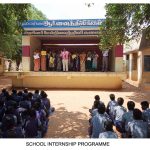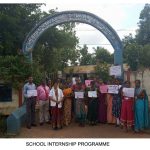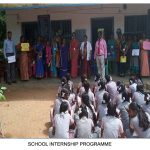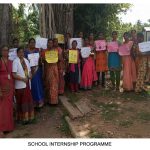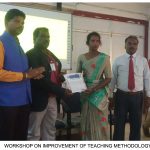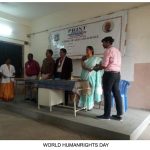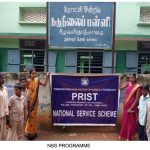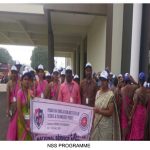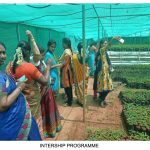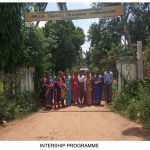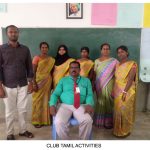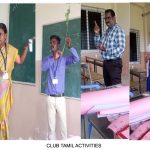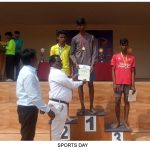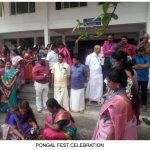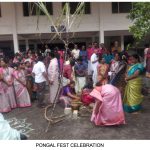The School of Education was established in the year 2008. As teacher education plays a vital role in all branches of education, the school functions with an aim to make its students, efficient teachers in future. The school of education believes in activity based teaching and students are encouraged and guided to improve their language skills. Students are being given practice for their progress in career advancement.
Faculty members organize seminars, conferences, workshops, that offer a vibrant atmosphere to students to nurture the spirit of teaching and learning.
Vision:
- To impart value–oriented ‘Teacher Education’
- To develop professional competency and social responsibility.
- To keep abreast of trending technologies in teaching and learning.
- Delivering to the nation professional teachers with a humane touch.
Mission:
- Preparing students to successfully handle real life challenges.
- To train students in becoming familiar with trending technologies to meet growing challenges in imparting education
- To bring out the latent talents of the students who are future teachers.
- Aim at an engagement with current educators, offering them guidance in professional development, leading them in education research
SCHOOL OF EDUCATION
B.Ed., Programme (2 – Year)
- Programme Educational Objectives (PEOs)
PEO1.To prepare professional and humane teacher who will be able to face many challenges as well as other forces impinging upon the consciousness of the pupils.
PEO2.To develop the competency to teach subjects of their specialization with fluency over the language at the upper primary /middle levels (classes VI-VIII), Secondary (Classes IX, X) and Higher secondary (Classes XI, XII) levels.
PEO3.To have the teachers favourable attitudes and adequate interest which will enable them to foster all round development?
PEO4. To make the teacher efficient enough to offer educational guidance and counselling to individual learners.
PEO5.To enable the teacher trainees undertake action research to solve their professional problems.
PEO6.To reduce the gap between theory and practice, teacher and education curriculum and school realities.
PEO7.The course (B.Ed.,) will provide adequate theoretical orientation regarding the objectives of education in the Indian Background.
2. Programme Outcomes (POs)
On successful completion of the two-year B.Ed. programme, pupil teachers will be able to develop:
PO1. Teaching competency: Know, select and use of learner-centered teaching methods, understanding of paradigm shift in conceptualizing disciplinary knowledge in school curriculum, necessary competencies for organizing learning experiences, select and use of appropriate assessment strategies for facilitating learning.
PO2. Pedagogical skills: Applying teaching skills and dealing with classroom problems.
PO3. Teaching through Non-Conventional Modes: Evolving a system of education which enhances the potential of every learner to acquire, retain and transform knowledge leading to wisdom society through creative, experiential and joyful modes of learning.
PO4. Integration of Artificial Intelligence in Education: Transform the educational landscape by providing open access to quality, value based and socially relevant education to all by harnessing the disruptive potential of AI.
PO5. Critical Thinking: Analysis of Curriculum, construction of blue print, selecting appropriate teaching strategies according to needs of students and conducting action research to solve classroom problems.
PO6. Effective Communication: Presenting seminar before peer students and teachers and practicing communication skills through various linguistic activities and applying it for better classroom communication.
PO7. Sensitivity towards Inclusion: Identifying the diversities and dealing it in inclusive classrooms environment, guidance and counselling programmes for disabled students.
PO8. Content Analysis: Analyse the text-books and syllabus.
PO9. Effective Citizen Ethics: Understand different values, morality, social service and accept responsibility for the society.
PO10. Self-directed Learning: Preparing scripts for seminars, lesson plans and online content.
PO11. Social Resilience: Understand about social entities and enable to cope up with adverse conditions of life.
PO12. Physical Development: Practice yoga, physical education and games and sports
PO13. Team Work: Enable to work as a member or leader in diverse teams and in multi- disciplinary settings by following the principles of collaborative learning, cooperative learning and team teaching.
- Programme Specific Outcomes (PSOs)
PSO1. Enable to understand learner and his learning environment, contemporary India and education, school management, gender, school and society.
PSO2. Enable to comprehend Language across the curriculum, Reading and reflecting on. Texts, Drama and Art in Education, developing Communication Skills and observation of school activities by school internship.
PSO3. Understand the individual differences among students, measuring the attainment, evaluating progress, and assessing learning abilities, guidance and counselling programmes, educational technology, ICT and lesson planning.
PSO4.Practice teaching in Schools, inculcate the real experiences of classroom teaching and online teaching by using ICT and its different tools and software.
PSO5.Understand the classroom diversities and enable them to deal with diverse learners in inclusive classroom setup, environmental education, Field Engagements with community and Community Participation (NSS, Community Services etc.).
SCHOOL OF EDUCATION
M.Ed., Programme (2 – Year)
- Programme Educational Objectives (PEOs)
PEO1: To produce qualified and competent teachers and teacher educators
PEO2: To provide knowledge on historical, philosophical and sociological foundation of
Educational practices
PEO3: To provide training to become educational psychologists and counsellors
PEO4: To provide opportunities to critically examine and reflection the concept, Content, organization and status of elementary and secondary teacher education Curriculum, infrastructure, and resources needed, and issues and problems related to Teacher preparation
PEO5: To give training to design and develop curriculum, syllabus, and textbooks and preparation of other instructional materials
PEO6: To provide input on various methods of research, select develop research tools, apply appropriate statistical techniques to analyse the data and infer results
PEO7: To motivate to learn and use sound principles and techniques in the learner- Centered instructional process
PEO8: To encourage actively participate in educational measurement and evaluation processes
PEO9: To produce educational planners, administrators, managers, supervisors, researchers and other educational experts
PEO10: To develop skills to identify and solve the educational problems at national and international level
PEO11: To critically examine the role and functions of various agencies including regulatory bodies in enhancing the quality of teacher education
PEO12: To make to understand education as a discipline of study
PEO13: To motivate to use the information and communication technologies (ICTs) in the teaching learning process
PEO14: To enable to realize the importance of early childhood care and education
PEO15: To examine the status and issues related to women and the role of Education to address the issues
PEO16: To know the importance of special and inclusive education and legislative Measures to deal with education of children with diverse needs
PEO17: To prepare to carryout field internship, practical and dissertation works
2. Programme Outcomes (POs) :
PO1: Able to demonstrate the competencies of teacher educators
PO2: Understand the historical, philosophical and sociological implications of education
PO3: Able to serve as educational psychologists and counsellors
PO 4: Able to provide constructive feedback to restructure the elementary and secondary teacher education programmes and teacher preparation process
PO5: Capable of designing and developing curriculum and other learning resources
PO6: Able to demonstrate the research skills by undertaking research projects
PO7: Realises the values of learner-centered instruction
PO8: Actively participate in educational measurement and evaluation processes
PO9: Capable to serve as educational planners, administrators, managers, Supervisors and other positions in the field of education
PO10: Able to provide solutions to educational problems
PO11: Able to suggest measures for effective functioning of various Agencies including the regulatory bodies to enhance the quality of teacher education
PO12: Understand education as a separate discipline
PO13: Capable of using the information and communication technologies (ICTs) in teaching learning process
PO14: Understand the importance of early childhood care and education
PO15: Realises the importance of education in improving the status of women and addressing their issues
PO16: Understand the emerging trends in education for children with special needs
PO17: Explain the skills needed to successfully complete the field internship, practicum components and dissertation work
- Programme Specific Outcomes (PSOs)
PSO1: Analytical and reasoning skills.
PSO2: Team work and leadership quality
PSO3: Critical thinking and problem solving ability
PSO4: Scientific reasoning and research competencies
PSO5: Digital literacy and communication skills
PSO6: Self-directed and life –long learning
Curriculum and Syllabus
B.Ed. Curriculum and Syllabus.
M.Ed. Curriculum and Syllabus.
Recent Ph.D.s Awarded
2024 – 25
- A study on the Role of Teachers in Moral Education in the Secondary Schools of the Nilgiris District. Mr.Fr. Sri. S. Marshal Joseph. August 2024
2023 – 24
- Effectiveness of computer assisted learning and technique on the achievement, attitude and study habit of students in English as school language for the topic language across curriculum at B.Ed. level, Ms. W. Gladys Colcraft, March 2024
2022 – 23
- Educational goal achievement motivation and academic performance of higher secondary school students in Thiruvannamalai district. Ms. R.Santhi, January 2023
- Effectiveness of yoga on memory, emotional competence and academic achievement of secondary studies. Mr. N.V. Anthony, April 2023
- A Study on learning strategies and goal orientation in relation to academic achievement of higher secondary school students., Ms. P. Kavitha. April 2023
- Value orientation family environment and prosocial attitude among prospective teachers at secondary level. Ms. JS.P. Rose Mary, May 2023
- Study on achievement in mathematics of higher secondary students in the general coastal area of Kerala in relation to their mathematical interest parent involvement and socio-economic status. Mr. PL. Varghese, July 2023
2019-20
- ‘Formulating innovative solutions for the problems of adolescent students at higher secondary level’, Ms.Parvathy Mouleshwaran, September 2019
- ‘A study of school effectiveness in relation to right to education act 2009 and job satisfaction of headmasters at upper primary level’, Ms. R. Kalaiarasi, January 2020
2018-19
- ‘School effectiveness in relation to leadership profile and personality types of head masters at secondary and higher secondary school level’, Maruthavanan, January 2019.
- ‘Developing employable skills through vocational based curriculum’, S.K.Muthuraja, February 2019
- ‘Impact of computer assisted language learning and video assisted instruction on the achievement of students in written communication and study habit in Tamil at secondary level’, S. Selvaraj, June 2018.
2017-18
- ‘Impact of effective small group learning and web-based learning on pupils’ achievement for the topic environmental education at upper primary school level’, A.Regana Banu, December 2017.
- ‘Effectiveness of e-learning and concept mapping techniques on pupils’ achievement for the topic environmental education studying at secondary school level’, D.Muruganantham, June 2017
- ‘Academic achievement of secondary school students in relation to their parental involvement and computer self-efficacy’, A.LeelaBernath, March 2018.
- ‘A study on emotional intelligence attitude, guidance needs and academic achievement of science students in arts and science colleges’, T.Vimala, February 2018.
BOOKS
2023 – 24
Pedagogy of Computer Science: Part – III by Mr. T. Selvaraj, published on January 11, 2023, provides educators with effective teaching strategies and methodologies for computer science. This book aims to improve the delivery of computer science concepts and enhance students’ understanding of the subject. The ISBN for this book is 978-93-6255-920-3.
Pedagogy of Economics: Part III by Ms. R. Vaishnavi, published on February 8, 2023, offers insights into effective teaching strategies for economics. The book provides educators with approaches to make economic concepts more accessible and engaging for students. The ISBN for this book is 978-93-6255-223-5.
Pedagogy of History – Part III by Ms. T. Subhashini, published on February 9, 2023, focuses on effective teaching methods for history education. This book provides educators with strategies to engage students and enhance their understanding of historical events and concepts. The ISBN for this book is 978-93-6255-288-4.
Pedagogy of Commerce and Accountancy – Part III by Ms. R. Vaishnavi, published on April 24, 2023, focuses on effective teaching methodologies for commerce and accountancy subjects. The book aims to equip educators with strategies to enhance the learning experience and understanding of commerce and accountancy concepts. The ISBN for this book is 978-93-6255-263-1.
Knowledge and Curriculum by Ms. R. Vaishnavi, published on April 29, 2023, focuses on the relationship between knowledge and curriculum design. The book provides valuable insights into how curricula can be structured to effectively deliver knowledge and enhance learning experiences. The ISBN for this book is 978-93-6255-121-4.
Pedagogy of Mathematics Part – III by Dr. M. Aron Antony Charles, published on June 2, 2023, delves into advanced teaching strategies for mathematics. This book is designed to guide educators in enhancing their methods for teaching mathematics effectively, ensuring a deeper understanding of the subject for students. The ISBN for this book is 978-93-6255-682-0.
Pedagogy of English: Part – III by Ms. T. Subhashini, published on June 25, 2023, explores effective teaching strategies for English education. This book aims to provide educators with insights and approaches to enhance their teaching of the English language, fostering better learning outcomes for students. The ISBN for this book is 978-93-6255-305-8.
2022 – 23
Pedagogy of Biological Science: Part – II by Dr. Najeema, published on February 5, 2022, provides teaching strategies and insights for educators in the field of biological sciences. The book focuses on enhancing the pedagogical approaches used to teach biology, aiming to improve student engagement and understanding of the subject. The ISBN for this book is 978-93-6255-932-6.
Pedagogy of Commerce and Accountancy: Part – II by Ms. R. Vaishnavi, published on March 15, 2022, focuses on teaching methods and strategies for commerce and accountancy education. The book provides educators with practical approaches to enhance students’ understanding of these subjects and improve their learning experience. The ISBN for this book is 978-93-6255-543-4.
“Pedagogy of Biological Science – Part III” is a book authored by Dr. R. Gunasekaran. It was published on April 26, 2022, and has the ISBN number 978-93-6255-251-8. The book offers insights into the pedagogy of biological sciences, aimed at enhancing the teaching and learning experience in the field.
Pedagogy of Computer Science: Part – II by Mr. T. Selvaraj, published on June 12, 2022, focuses on effective teaching strategies for computer science. The book aims to provide educators with methodologies to make computer science concepts more engaging and accessible to students, enhancing their learning experience. The ISBN for this book is 978-93-6255-572-4.
Pedagogy of History: Part – II by Ms. T. Subhashini, published on June 28, 2022, focuses on advanced teaching strategies for history education. The book offers educators valuable insights and methods to enhance students’ understanding of historical concepts and events. The ISBN for this book is 978-93-6255-791-9.
Pedagogy of Economics: Part – II by Ms. R. Vaishnavi, published on September 8, 2022, offers teaching strategies and insights for educators to effectively teach economics. The book aims to improve the understanding of economic concepts among students by providing structured and engaging pedagogical approaches. The ISBN for this book is 978-93-6255-647-9.
Environmental Education by Dr. R. Gunasekaran, published on December 25, 2022, focuses on the importance of environmental education in promoting awareness and responsibility towards the environment. The book provides strategies for educators to integrate environmental topics into their teaching and foster sustainability among students. The ISBN for this book is 978-93-6255-794-0.
2021 – 22
Pedagogy of Physical Science: Part III by Dr. R. Gunasekaran, published on May 11, 2021, focuses on effective teaching methodologies for physical science. This book offers valuable insights for educators to enhance their approach to teaching physical science, aiming to improve learning outcomes for students in the subject. The ISBN for this book is 978-93-6255-846-6.
Pedagogy of Commerce and Accountancy: Part – I by Ms. R. Vaishnavi, published on June 5, 2021, focuses on effective teaching strategies for commerce and accountancy education. The book provides valuable insights for educators to enhance their teaching methods, helping students better understand and engage with commerce and accountancy concepts. The ISBN for this book is 978-93-6255-344-7.
Peace Education by Dr. R. Gunasekaran, published on August 15, 2021, explores the importance of peace education in fostering understanding, tolerance, and harmony. The book offers strategies for educators to incorporate peace-building concepts into their teaching, aiming to nurture peaceful and compassionate individuals. The ISBN for this book is 978-93-6255-886-2.
Pedagogy of Economics: Part – I by Ms. R. Vaishnavi, published on September 15, 2021, offers insights into effective teaching methods for economics education. The book provides educators with strategies to make economic concepts more accessible and engaging for students, fostering a deeper understanding of the subject. The ISBN for this book is 978-93-6255-096-5.
Pedagogy of History: Part – I by Ms. T. Subhashini, published on November 2, 2021, focuses on teaching strategies for history education. The book provides valuable methodologies for educators to enhance the teaching of historical concepts and engage students in understanding the past more effectively. The ISBN for this book is 978-93-6255-688-2.
2020 – 21
Pedagogy of English: Part – I by Dr. Jasmine Sudhanthira Devi, published on March 5, 2020, focuses on effective teaching strategies for English language education. The book offers insights into how educators can enhance their methods of teaching English, making the subject more engaging and accessible for students. The ISBN for this book is 978-93-6255-913-5.
Assessment for Learning by Mr. T. Selvaraj, published on March 5, 2020, explores the role of assessment in the learning process. The book provides educators with strategies to use assessments effectively to enhance student learning, focusing on how assessments can be used to guide and improve teaching methods. The ISBN for this book is 978-93-6255-254-9.
Pedagogy of Biological Science: Part – I by Dr. D. Muruganantham, published on March 12, 2020, focuses on effective teaching strategies for biological science education. The book offers valuable insights for educators on how to teach biological concepts in an engaging and understandable way, aiming to improve student learning outcomes. The ISBN for this book is 978-93-6255-292-1.
Pedagogy of Physical Science: Part – I by Dr. R. Gunasekaran, published on March 25, 2020, focuses on effective teaching methodologies for physical science. The book provides educators with strategies to enhance the learning experience and understanding of physical science concepts, helping students engage more deeply with the subject. The ISBN for this book is 978-93-6255-139-9.
Pedagogy of Computer Science: Part – I by Dr. R. Gunasekaran, published on June 15, 2020, focuses on effective teaching strategies for computer science education. The book provides educators with methods to enhance their approach to teaching computer science, ensuring that students grasp key concepts and skills in the subject. The ISBN for this book is 978-93-6255-858-9.
Pedagogy of Mathematics: Part – I by Mr. T. Selvaraj, published on August 22, 2020, focuses on effective teaching strategies for mathematics education. The book provides educators with valuable insights and techniques to make mathematical concepts more accessible and engaging for students, enhancing their understanding and interest in the subject. The ISBN for this book is 978-93-6255-668-4.
2019 – 20
Yoga, Health and Physical Education by Dr. R. Gunasekaran, published on May 12, 2019, focuses on the integration of yoga and physical education in promoting overall health and well-being. The book provides valuable insights for educators to incorporate yoga and physical activities into the curriculum to enhance students’ physical fitness and mental health. The ISBN for this book is 978-93-6255-042-2.
Psychology of Learners and Learning by Ms. R. Vaishnavi, published on August 22, 2019, explores the psychological aspects of learning and how it influences the teaching process. The book provides educators with insights into understanding learners’ cognitive and emotional development, helping to tailor teaching strategies that align with students’ psychological needs. The ISBN for this book is 978-93-6255-421-5.
2018 – 19
Pedagogy of Physical Science: Part – II by Dr. R. Gunasekaran, published on January 4, 2018, focuses on effective teaching methodologies for physical science. The book provides educators with strategies to engage students and enhance their understanding of physical science concepts. The ISBN for this book is 978-93-6255-181-8.
Contemporary India and Education by Ms. T. Subhashini, published on March 11, 2018, explores the relationship between contemporary Indian society and its educational system. The book provides insights into the challenges and opportunities within India’s education system and examines how it can evolve to meet the needs of modern society. The ISBN for this book is 978-93-6255-036-1.
Teaching and Learning by Mr. T. Selvaraj, published on June 10, 2018, focuses on the fundamental principles and practices of teaching and learning. The book provides educators with insights into effective teaching strategies, aiming to improve the overall learning experience for students across various subjects. The ISBN for this book is 978-93-6255-457-4.
Pedagogy of Mathematics: Part – II by Dr. M. Aron Antony Charles, published on August 22, 2018, offers educators strategies and techniques to improve the teaching of mathematics. The book provides insights into making mathematical concepts more accessible and engaging for students. The ISBN for this book is 978-93-6255-455-0.
Pedagogy of English: Part – II by Dr. T. S. Parvathy, published on November 11, 2018, focuses on effective teaching strategies for English language education. The book provides valuable insights into enhancing the teaching and learning process of English, helping educators develop engaging methods for students. The ISBN for this book is 978-93-6255-842-8.
Research Areas
- Professional Ethics and Teaching Competencies
- Total Quality Management in Education
- Multimedia Approach to Education
- Web – Based Learning for Environmental Education
- Web – Based Learning for History course for B.Ed., Students
- Cultural Fest on “Chem-Fest 2024” held on 16.04.2024, organized by the Department of Chemistry.
- Technical Fest on “Chemistry Department Technical Fest-24” held on 16.04.2024, organized by the Department of Chemistry.
- Career Counseling Program on “Formulae for Success” held on 20.03.2024, organized by the Department of Chemistry.
- Soft Skills Program on “Employability Skills Program” held on 07.03.2024, organized by the Department of Chemistry.
- Competitive Examination Guidance Program on “Success to TNPSC” held on 05.02.2024, organized by the Department of Chemistry.
- Awareness of Trends and Technology Program on “A Curated List of Cheminformatics Software and Libraries” held on 26.10.2023, organized by the Department of Chemistry.
- Career Counseling Program on “Higher Education in India: Challenges and Opportunities” held on 19.10.2023, organized by the Department of Chemistry.
- Club Activities Program on “Graduate Student Interdisciplinary Research Club (GSIRC)” held on 17.10.2023, organized by the Department of Chemistry.
- Soft Skills Program on “Communication Skills and Interview Techniques” held on 04.09.2023, organized by the Department of Chemistry.
- Language & Communication Skills Program on “Writing an Article for the Press” held on 29.08.2023, organized by the Department of Chemistry.
- Language & Communication Skills Program on “Trends in Communication” held on 29.08.2023, organized by the Department of Chemistry.
- Life Skills Program on “Workshop on Reference Management Using Mendeley Cite with Microsoft Office 365” held on 30.08.2023, organized by the Department of Chemistry.
- Competitive Examination Guidance Program on “SET and NET Coaching for Success” held on 22.08.2023, organized by the Department of Chemistry.
- Life Skills Program on “Analytical Chemistry: Data Analysis” held on 15.03.2023, organized by the Department of Chemistry.
- Special Seminar on ‘Nanoscience’ 1st November 2022 at PRIST Deemed to be University, Thanjavur.
- Seminar on ‘Concepts in Bioinorganic Chemistry’ 5th May 2022 at PRIST Deemed to be University, Thanjavur.
- Webinar on ‘Supramolecular Chemistry: Analytical methods and biomedical applications’ 24th April 2021 at PRIST Deemed to be University, Thanjavur.
- Webinar on ‘Corrosion and its Mitigation Strategies: Fundamental Aspects and Recent Approaches’ 13th April 2021 at PRIST Deemed to be University, Thanjavur.
- Hands on Training on ‘X-ray Crystallography and Interpretation’ on 22/09/2019 at PRIST Deemed to be University, Thanjavur.
- International Conference on Advanced Chemical and Structural Biology – ICACSB-2019 between 19th to 21st February 2019 at PRIST Deemed to be University
- Summer School on ‘Drug Discovery and Development’ during 16th – 20th July 2018 at PRIST Deemed to be University, Thanjavur.
- Lecture-cum-Workshop on ‘Interpretation of Spectral, Chromatographic, Crystallographic, Computational data of Chemical systems’ January 28-30, 2016. Jointly organized by PRIST University and IICPT, Thanjavur, Tamil Nadu.
Head, Department of Education, School of Education,
Ponnaiyah Ramajayam Institute of Science and Technology(PRIST), Vallam,Thanjavur -613403.
Email:
Email:deanedu@prist.ac.in
Phone:
04362 -265021
.

